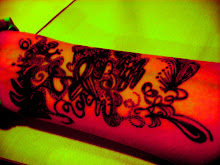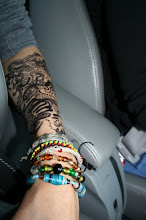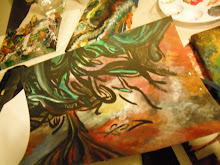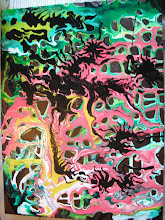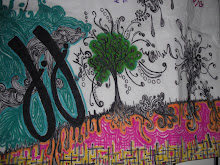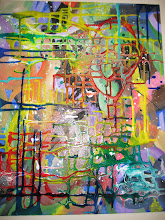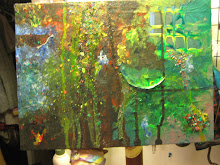Before I introduce you to the rest of my time in treatment after February 5th, 2007, I feel the need, or the desire rather, to back up and share a few snap shots that each play a part, some big and some small, in what led to my arrival at the facility outside of Chicago, IL. Seeing as how I went to bed on February 5th, 2007 wanting nothing to do with God, I will avoid the beaten path around the bush and get straight to the point by starting with just that... God. He is who I wanted nothing to do with that night, and He is who has me sitting here today, telling a story of redemption that is still in motion.
On that note, let us begin...
As with most people I know, I was a child once. As a child I grew up in a beach community on the coast of South Carolina. It was a small town, and as with most small towns in the south, everybody knew every body's business. As if everybody didn't already know every body's business, my father was the pastor of one of the few local churches, the better of the church options, in my biased opinion. It didn't matter whether I wanted people to know my business or not, they did simply because my father was a public figure, and as with most small towns in the south, the community wants their public figures and their families to be on their best behavior, especially if those public figures are Christian. I get it, I'm not saying I don't understand that mind set, but I am saying that putting the pressure of perfection on someone, even a public figure, is quite an un-Christian thing for Christians and un-Christians to do.
People's expectation for my father to be perfect began at a young age for him as well, in another small town in the south, long before a family of his own was ever an idea in his young little mind. My father's father was a music evangelist... you know, the kind everyone loves and praises because of his devotion to God, yet his own children don't even know him as their father. After all, how can they when he's out on the road singing about Jesus to everybody else? This may sound harsh, and in some ways, it is, but the truth is harsh, and the truth is that I'm sick of bearing my family name and being expected to smile just because I have a grandfather who sings about Jesus to everybody else.
Along with that, I am almost positive one of the first things my grandmother taught all of her children to do was to smile. Sounds sweet, right? With phrases like "smile, Jesus loves you," "turn that frown upside down," and "with Christ in my vessel, I can smile at the storm," my grandmother was never not smiling. It seems like a pleasant enough idea, but when a child is told not to cry but instead to smile, regardless of how they feel, it can actually be quite damaging. It wasn't intentional poor parenting on my grandmother or grandfather's part, I truly believe they were doing the best they could with what they had, so I'm not trying to paint them in a bad light, but I am trying to paint them in a real light. A light that exposes the hurt underneath the smiles and underneath all the songs about Jesus. My father didn't know his own father and he was told to smile about it. I wonder if my small town in the south knows about that.
And so my father grew up, and married a woman who thought she was marrying into the perfect family, only to discover the oppression that came with each and every smile. She took on a last name that meant she had to play a certain role, and when she began to question that role I can just hear my grandmother's response in her sweet, southern voice, "now honey, we don't question, we smile."
No questions, just smiling. This, in a nut shell, from a child's perspective, seemed to be the Christian philosophy my grandparents lived by. And this is the sort of Christian philosophy I want nothing to do with.
And so we have my parents, in my small town in the south, leading a church under the notion that they simply had to keep it all together or else. People who had seen my grandfather on t.v. were now watching my father in the flesh, and I'm sure they wanted just as good of a performance. Let me clarify, as I'm not saying my grandfather was merely performing and that's all, the man still dearly loves Jesus and I admire that, but just like the worship team that sings great songs with awesome crescendos on Sundays, when you're in the spotlight sometimes performance more than actual worship is just unintentionally part of the gig.
I can't say that everybody expected such a performance. I think some people were real enough with their own hurts to say they didn't mind that their pastor wasn't Christ himself, but I can say that many people expected my father to be just that. I know this because many people expected that of me.
I remember the day I realized I was different, not because of who I was, but because of who my father was. I was in fifth grade. It was during Sunday school, which is where all the kids were dismissed to after the music so they didn't have to sit through "big church." The kids were divided by age. My older sister was out of Sunday school by then and trying to endure big church, not because she liked it, but because she was trying to be a big girl, and my younger brother and sister were in the age class below me. My Sunday school teachers were a married couple, older, obviously to a child, but I remember thinking they were probably approaching death soon since they were in their late forties or fifties. That day the class was asked to recite the Bible verses they were supposed to have memorized from the prior Sunday. I was called on first, go figure. I had huge bows in my hair, a southern classic, and a dress with semi-poofed sleeves. That day, though so long ago, remains etched in my mind.
I giggled and said I didn't know. The husband asked what I meant when I said I didn't know; the wife just smiled. It all seemed so familiar, like deja-vu. "I didn't memorize the verse," I said. The husband sighed as if disappointed, looked at me and replied, "well, Jennie Barrows, out of all the kids in this class, you should be the first one to have had it memorized... you're the preacher's kid!"
I didn't say it out loud, as I was still trying to figure out the difference between talking back and voicing my opinion, but I remember thinking to myself, "what does my dad have to do with this?" The husband called on the kid next to me, I still remember who, but I won't call him out, and of course he had his verse memorized. When the husband told Bible-boy next to me that he had done a great job, I wanted to ask if it was because his dad was an architect.
I giggled and said I didn't know. The husband asked what I meant when I said I didn't know; the wife just smiled. It all seemed so familiar, like deja-vu. "I didn't memorize the verse," I said. The husband sighed as if disappointed, looked at me and replied, "well, Jennie Barrows, out of all the kids in this class, you should be the first one to have had it memorized... you're the preacher's kid!"
I didn't say it out loud, as I was still trying to figure out the difference between talking back and voicing my opinion, but I remember thinking to myself, "what does my dad have to do with this?" The husband called on the kid next to me, I still remember who, but I won't call him out, and of course he had his verse memorized. When the husband told Bible-boy next to me that he had done a great job, I wanted to ask if it was because his dad was an architect.
From that day on, I realized I was being watched, and how I lived my life was going to be reflective of my father's role as the pastor. I remember being scared and anxious, wondering what would happen if I messed up, what would people think of my father. I held the pressure in my hands and I squeezed it tightly... something I still do when I get anxious. I hated my Sunday school teacher that day, which seemed like the worst sin possible at that age, but I felt like I suddenly had to grow up when I wasn't ready. That seemingly small comment never left me, nor the pressure that came with it. It followed me all the way to treatment on February 5th, 2007.
I don't believe my Sunday school teacher had any idea of the impact his comment would make, nor do I believe he meant it maliciously, in fact he probably forgot all about it after that, and so I no longer hold it against him, but as a fifth grader, I wasn't so convinced of his innocence. Realizing at a young age that people had certain expectations of my life and the life of my family, I began my quest for perfection so as not to let down those around me, and especially those who thought the pastor's kid should know better than all the other kids when it came time to behave.
It's funny (now) because, for me, what may have looked like a happy and pleasant life to people on the outside, I remember being filled with much anger and anxiety. What if I mess up? Why do people care? What will they say about my dad? How will I keep up? All of these questions filled my mind and the harder I tried to be the good pastor's kid, the more angry I became. I kept up with my manners in the community, but it was the community I was mad at. I never felt the pressure for perfection inside my home, it was never my parents who led me to believe I needed to be perfect. They were beautiful in how they displayed grace and most excellent in the area of discipline. After growing to love the flavor of vinegar from having to "taste the bitterness" of my words so often, they resorted to "washing my mouth out" with soap; a creative effort on their part, but an angry heart with a dirty mouth is hard to clean.
When being punished they always clarified that I was being disciplined in love, and it was for my benefit that they wanted me to learn the consequences of my actions. My mother was always quick to separate the action from the identity of the child by saying things like "you're not a bad girl, but what you did was very bad." I knew my parents loved me, but once out of the house and in the public eye, I felt the need to perform, wondering who actually liked me for me and not for who they wanted me to be... a "Barrows".
While I felt loved inside the home, it was inside the home that most of my anger came out. My siblings retell stories, in laughter now, of me chasing them around the kitchen with a butcher knife, throwing a chair down the stairs, a lamp at my sister's head, and really anything else I could get my hands on. We laugh when we tell stories about how I would scream and cry, kick down doors until they literally came off the hinges, break window panes and punch the wall. We laugh because it's over and we all survived, thank God, but I sometimes still can't help but feel sad for that little girl who was so alone in her anger. I wonder if my small town in the south knows about that.
My parents, God bless them, had more than enough to deal with already, so I'm sure my anger didn't help the strain of small town living. I'm sure my anger didn't help the strain of church living. And I'm sure my anger didn't help the strain of family living. But none the less, they embraced what they got and what they got was me. I have been through many phases with my parents, some of which I will touch on later, but what I will say is that they have never given up on me, no matter how dark and ugly my struggle, and I consider it an honor to be a part of their most imperfect, most beautiful lives. I shall stake my claim here and say that I will never give up on them.
So our family continued on in our small little community and I continued to resent those around me. Though my father spoke beautifully about grace and love on Sundays, I never payed enough attention for it to actually sink in. I was always falling asleep on the person's lap next to me, one time actually drooling on another girl's Easter dress, or trying to light my friends hair on fire during candle light services, or most of the time just wondering when dad would wrap it up so we could go eat lunch. During one service I actually stuck my arm up in the air and pointed at my wrist and mouthed "LUNCH." That one didn't go over too well.
All that to say, had I maybe have been paying attention to this idea of Jesus being about grace and love and not about smiling all the damn time, like at family reunions, I might have learned how to love those around me who I resented so much. I might have realized that they were hurt and broken people too, who put unrealistic expectations on me because they had unrealistic expectations on themselves. I might have felt free to be myself because Jesus saw the ugly nature of my heart, even as a child, and loved me anyway. I might have come to all of those conclusions, but then again, I might not have. Either way, that's not for me to figure out now. I don't think God works in the "what ifs" or "would haves," so what's done is done and my story is my story.
But there is hope, because God is still writing it! It doesn't always go the way I want it to go, as some chapters are harder than I would have them be, but God has this gift as a creator, an artist, and a writer to make beauty out of pain and the most blinding light out of deep darkness. As a child, I let the church write my story, perhaps unaware that they were even playing such a key role in my life. I did what they told me to do and lived how they told me to live. I went home, angry and tired, beat a few walls, perhaps a few siblings, and often cried myself to sleep. I think I was too angry to let truth penetrate my heart, and I increasingly grew less and less interested in what God had to offer. Never would I have spoken that aloud, not to a single soul would I have ever revealed the questions I had about this God who smiled so much. Not even to God Himself would I ask those questions. I knew better.
So at a very young age, I had come to know the term perfection and I got to working on it. At the time, I associated perfection solely with Christianity, but it was only a matter of time before this idea of perfection seeped into other areas of life; areas I thought I had compartmentalized and could keep separate from Christianity, so as to take a breather when I needed it. Little did I know, perfectionism doesn't allow much time for breathers and trying to keep up was going to lead to a burn-out from exhaustion.
Leaving this snapshot, but the memory of it still fully present in my mind, I woke up on February 6th, 2007, quite imperfect and perfectly content with the idea of abandoning the God of perfection, who I thought had already abandoned me.
Mona came into the room to get our stats before any of us had gotten out of bed. She unlocked the bathroom so I could relieve myself and change into a hospital gown so that she could weigh me. I remember being quite glad that I could pee first and take off all my clothes before being weighed so that the number on the scale would appear less, even though I wasn't allowed to see it. I didn't realize I actually wanted to play the opposite game with the staff, while keeping my weight down I wanted to make it appear to be more so that they wouldn't make me gain any more weight.
The number on the scale to someone with an eating disorder (perhaps depending on the sort) is both a badge of honor and a mark of shame. You're never actually satisfied no matter what the number is. If you can get it to be less than before, you feel high and mighty and accomplished for a second, but before you finish that thought, you begin to think about how you can make it go down before you step on the scale again. I heard an angry girl once say "scales are for fish!" I didn't know what she meant until I experienced my own obsession with the scale. To this day, I will not step on a scale, unless at the doctor's office, in which case I ask not to know the number. I almost lost my mind to a scale, and so I'm done with scales, scales are for fish!
On the morning of February 6th, 2007, however, at 6:30am, I stepped on the scale and tried to peek under the piece of yellow paper that Mona had covered up the number with. I was worried as I saw her write on her notepad. "Is it more or less?" I quietly whispered, as Lauren and Ashley were still sleeping. "Girl, I can't tell you that," she sort of giggled, " but don't worry boo boo, you're just fine!"
I started to go through my dresser drawers as Mona took the other girls' stats. I laughed watching Mona try to wake up Ashley. Ashley just shot her arm straight up in the air and mumbled "do your shit," which sounds mean but when whispered by a girl just waking up from her sleeping pills, it actually sounded quite nice, and more funny than anything else. Upon Lauren getting up, she turned the lights on and the three of us were stirring about getting ready for the morning. After Mona was done, Lauren put on a Gorillaz CD. "By the way," Lauren asked, "how did you like that CD last night?" I told her I had fallen asleep before really hearing any of it, but that I did like Desmond Tutu's accent and mimicked it as best as I could... "Dea Chald oof Good." We both laughed as we continued getting dressed. I will never forget Lauren that morning, shuffling around, bobbing her head back and forth to "Feel Good Inc" by Gorillaz. When the time came in the song, the three of us, Lauren, Ashley and I, would throw our heads back and in unison sing "AH HA HA HA HA HA!" I was never a fan of Gorillaz before that moment, and I still couldn't tell you what other songs they sing, but that song will always bring back a pleasant memory for me.
Before the CD was halfway through, we had all gotten dressed and locked our toiletries back up. Lauren shut off the CD player, I put on my bright orange Harley Davidson jacket, and we walked out to the lobby where the morning BHA was waiting to take us over to the adolescent lodge. I was nervous about walking back through the double doors of that lodge given what had just happened the night before, but I figured it couldn't get much worse. When we got there most of the girls were waiting by the doors to be escorted to breakfast. I was told I had to eat in the kitchen lodge again as I was still on 24 hour lock down for new admissions. "Come dinner time you should be able to go to the cafeteria," a BHA said to me.
I sat down in the main seating area of the adolescent lodge, which I think we just started to call "the lobby," and again watched all of the other girls around me. Though there were only 3 adult patients, I was the only one admitted for an eating disorder. I looked at the adolescents in the lobby and tried to guess which ones had eating disorders, which ones were cutters, and which ones were crack addicts. Truth be told, I was sort of disappointed I couldn't tell. Whether it be a great detox program or the cold Chicago winters that had everyone bundled up and looking the same, I couldn't tell much difference between myself and them. It might have been the competitive mindset of someone with an eating disorder, or just that sweet southern nature that has one looking at everyone else's problems instead of their own, but either way I was armed and ready to judge all of the other girls around me.
All the girls, minus the ones on bad behavior or those admitted within the last twenty-four hours, were escorted out of the lodge to the cafeteria while the rest of us sat behind and watched. There weren't many of us left, but enough to fill the lodge kitchen. I sat down at the kitchen table next to Corrie who had already begun her morning rocking and whispering. Amanda, a female BHA with bright red hair, came walking in with Styrofoam to-go boxes. She placed them in front of the girls who were on meal plans, myself included. I was given oatmeal, which I was okay with at first, but when I saw what I was supposed to put in my oatmeal I started to panic. Though Corrie looked crazy on the outside, I knew her behavior was exactly how I felt on the inside, I just wasn't expressing it. In little individual packets I saw brown sugar and butter.
My very calm and rational thought process went something like this: "FUCK THAT! I am not putting that in my body. I'll eat the oatmeal, but there is no FUCKING way I am eating butter or brown sugar! These people are crazy. What is wrong with them? It's disgusting what they think is okay. They want me to get fat. They're jealous and they want me to get fat. Everyone that works here is fat and it's disgusting. All of this butter is probably why. I'm not touching it. I don't care what they say or what they do, they can tranq me for all I care, I'm not FUCKING touching it!"
Now, mind you, being someone with an eating disorder, I had done all the research there is to do on food and nutrition and diet and exercise. I understood the difference between mono-unsaturated and trans fats, I understood that muscle weighed more than fat, and I understood that carbs were necessary for "fuel" which was necessary for exercise, my second obsession. The problem was not that my "research" was completely false persay, the problem was that my "research" was twisted, distorted, and exgaurated to a degree that was unhealthy and unrealistic. I used facts to back up my distortions (like what many people do with scripture, but more on that another time).
I literally thought that if I had that tablespoon of butter or small scoop of brown sugar in my bowl of oatmeal in that one sitting that I would gain weight... right there on the spot. I literally thought that certain foods, which by the time I entered treatment were almost all foods, were pure evil. I was about as certain as any severly paranoid person could be that the American food industry was out to get me... me personally. I have somewhat of a chuckle when I think about the severity of my paranoia on the matter, but that's only because I am on this side of recovery. Combine a heavy dose of anger with a good bit of paranoia and add an eating disorder on top of it and it makes for one pretty crazy person. I can say that because I am talking about myself. It seems silly, right? and almost pointless to talk about getting so upset over oatmeal add-ons, but the fact of the matter is, at 23 years old I found myself forced to sit in front of a plate of food and I couldn't do it without completely freaking out. To be afraid to eat when eating is necessary for survival... how does one possibly recover? I doubted one could and I hated the girls who said they did. I deemed them as sell-outs instead of recovered.
While Corrie sat next to me and whispered her thoughts, I sat staring at my oatmeal, churning my thoughts about in my head. Amanda asked Corrie to start with her breakfast and then looked at me and asked me to do the same. "Oh God," I thought "she's associating me with being like Corrie. I am not that crazy." When I think back on how I used to look at Corrie, I can't help but see how stone cold my heart was and how the only person I cared about was myself. As I was staring at my oatmeal, another girl sitting across the table from me blurted out "why are you here?" I looked up and she was staring at me. She had mascara smeared under her eyes and if she hadn't been in treatment I would have thought she was high. I just sat there not really knowing how to answer her, as I was wasn't even 100 percent certain she was taking to me. She kept looking at me, "why are you here?" she asked again.
"For an eating disorder," I said quietly.
"How long have you had it?" she asked, and I was irritated that she even wanted to know. "For about two years," I responded, just glad that it kept me from eating my oatmeal. She looked at me with her painted black eyes, looked at my food, then at hers and said "that's a long time," and then went back to eating. It was an awkward exchange between the two of us, but it wasn't the awkwardness that made me uncomfortable, it was my answer... "about two years." Without even thinking about it, that was the first time I answered that question honestly. I had been in denial for so long that it caught me off guard when I realized exactly how long it had been since I had first started struggling.
In that moment I knew I didn't want to struggle anymore, but I also knew that I wasn't going to put that butter or brown sugar in my body. I had decided I would get the help that I needed, but I also decided that I would do it my way, not realizing how harmful that was going to be for my recovery in the long run. I took a few bites of my oatmeal and waited until no one was paying attention to me, then I picked up my small packet of brown sugar and the gold pad of butter with my napkin and crumbled it up in my hand. I held it there until breakfast was over and then got up and threw it away. This one small act in and of itself was not a big deal, I get that. But this one small act was the first step in the direction of deception as I learned how to cheat the system and only pretend to be the perfect patient.
Further along in the story I find myself in front of a panel of doctors, confessing that I had been throwing my food away while under their care; all of whom were shocked and said out of anybody in the facility, I was the last person they would have ever expected to be breaking the rules. Performed perfection... I had learned it well while growing up and this was just another role I found myself in where I had the opportunity to master that "skill."
But coming to that realization is later in the story... for now I am just an angry and mentally unstable preacher's kid who is sitting in front of a bowl of oatmeal, blaming everyone else, including God, for everything that is wrong with her. I knew that I wanted help, but I wanted it my way, and I won't find out until later that my way just doesn't work.
To be continued...
I don't believe my Sunday school teacher had any idea of the impact his comment would make, nor do I believe he meant it maliciously, in fact he probably forgot all about it after that, and so I no longer hold it against him, but as a fifth grader, I wasn't so convinced of his innocence. Realizing at a young age that people had certain expectations of my life and the life of my family, I began my quest for perfection so as not to let down those around me, and especially those who thought the pastor's kid should know better than all the other kids when it came time to behave.
It's funny (now) because, for me, what may have looked like a happy and pleasant life to people on the outside, I remember being filled with much anger and anxiety. What if I mess up? Why do people care? What will they say about my dad? How will I keep up? All of these questions filled my mind and the harder I tried to be the good pastor's kid, the more angry I became. I kept up with my manners in the community, but it was the community I was mad at. I never felt the pressure for perfection inside my home, it was never my parents who led me to believe I needed to be perfect. They were beautiful in how they displayed grace and most excellent in the area of discipline. After growing to love the flavor of vinegar from having to "taste the bitterness" of my words so often, they resorted to "washing my mouth out" with soap; a creative effort on their part, but an angry heart with a dirty mouth is hard to clean.
When being punished they always clarified that I was being disciplined in love, and it was for my benefit that they wanted me to learn the consequences of my actions. My mother was always quick to separate the action from the identity of the child by saying things like "you're not a bad girl, but what you did was very bad." I knew my parents loved me, but once out of the house and in the public eye, I felt the need to perform, wondering who actually liked me for me and not for who they wanted me to be... a "Barrows".
While I felt loved inside the home, it was inside the home that most of my anger came out. My siblings retell stories, in laughter now, of me chasing them around the kitchen with a butcher knife, throwing a chair down the stairs, a lamp at my sister's head, and really anything else I could get my hands on. We laugh when we tell stories about how I would scream and cry, kick down doors until they literally came off the hinges, break window panes and punch the wall. We laugh because it's over and we all survived, thank God, but I sometimes still can't help but feel sad for that little girl who was so alone in her anger. I wonder if my small town in the south knows about that.
My parents, God bless them, had more than enough to deal with already, so I'm sure my anger didn't help the strain of small town living. I'm sure my anger didn't help the strain of church living. And I'm sure my anger didn't help the strain of family living. But none the less, they embraced what they got and what they got was me. I have been through many phases with my parents, some of which I will touch on later, but what I will say is that they have never given up on me, no matter how dark and ugly my struggle, and I consider it an honor to be a part of their most imperfect, most beautiful lives. I shall stake my claim here and say that I will never give up on them.
So our family continued on in our small little community and I continued to resent those around me. Though my father spoke beautifully about grace and love on Sundays, I never payed enough attention for it to actually sink in. I was always falling asleep on the person's lap next to me, one time actually drooling on another girl's Easter dress, or trying to light my friends hair on fire during candle light services, or most of the time just wondering when dad would wrap it up so we could go eat lunch. During one service I actually stuck my arm up in the air and pointed at my wrist and mouthed "LUNCH." That one didn't go over too well.
All that to say, had I maybe have been paying attention to this idea of Jesus being about grace and love and not about smiling all the damn time, like at family reunions, I might have learned how to love those around me who I resented so much. I might have realized that they were hurt and broken people too, who put unrealistic expectations on me because they had unrealistic expectations on themselves. I might have felt free to be myself because Jesus saw the ugly nature of my heart, even as a child, and loved me anyway. I might have come to all of those conclusions, but then again, I might not have. Either way, that's not for me to figure out now. I don't think God works in the "what ifs" or "would haves," so what's done is done and my story is my story.
But there is hope, because God is still writing it! It doesn't always go the way I want it to go, as some chapters are harder than I would have them be, but God has this gift as a creator, an artist, and a writer to make beauty out of pain and the most blinding light out of deep darkness. As a child, I let the church write my story, perhaps unaware that they were even playing such a key role in my life. I did what they told me to do and lived how they told me to live. I went home, angry and tired, beat a few walls, perhaps a few siblings, and often cried myself to sleep. I think I was too angry to let truth penetrate my heart, and I increasingly grew less and less interested in what God had to offer. Never would I have spoken that aloud, not to a single soul would I have ever revealed the questions I had about this God who smiled so much. Not even to God Himself would I ask those questions. I knew better.
So at a very young age, I had come to know the term perfection and I got to working on it. At the time, I associated perfection solely with Christianity, but it was only a matter of time before this idea of perfection seeped into other areas of life; areas I thought I had compartmentalized and could keep separate from Christianity, so as to take a breather when I needed it. Little did I know, perfectionism doesn't allow much time for breathers and trying to keep up was going to lead to a burn-out from exhaustion.
Leaving this snapshot, but the memory of it still fully present in my mind, I woke up on February 6th, 2007, quite imperfect and perfectly content with the idea of abandoning the God of perfection, who I thought had already abandoned me.
Mona came into the room to get our stats before any of us had gotten out of bed. She unlocked the bathroom so I could relieve myself and change into a hospital gown so that she could weigh me. I remember being quite glad that I could pee first and take off all my clothes before being weighed so that the number on the scale would appear less, even though I wasn't allowed to see it. I didn't realize I actually wanted to play the opposite game with the staff, while keeping my weight down I wanted to make it appear to be more so that they wouldn't make me gain any more weight.
The number on the scale to someone with an eating disorder (perhaps depending on the sort) is both a badge of honor and a mark of shame. You're never actually satisfied no matter what the number is. If you can get it to be less than before, you feel high and mighty and accomplished for a second, but before you finish that thought, you begin to think about how you can make it go down before you step on the scale again. I heard an angry girl once say "scales are for fish!" I didn't know what she meant until I experienced my own obsession with the scale. To this day, I will not step on a scale, unless at the doctor's office, in which case I ask not to know the number. I almost lost my mind to a scale, and so I'm done with scales, scales are for fish!
On the morning of February 6th, 2007, however, at 6:30am, I stepped on the scale and tried to peek under the piece of yellow paper that Mona had covered up the number with. I was worried as I saw her write on her notepad. "Is it more or less?" I quietly whispered, as Lauren and Ashley were still sleeping. "Girl, I can't tell you that," she sort of giggled, " but don't worry boo boo, you're just fine!"
I started to go through my dresser drawers as Mona took the other girls' stats. I laughed watching Mona try to wake up Ashley. Ashley just shot her arm straight up in the air and mumbled "do your shit," which sounds mean but when whispered by a girl just waking up from her sleeping pills, it actually sounded quite nice, and more funny than anything else. Upon Lauren getting up, she turned the lights on and the three of us were stirring about getting ready for the morning. After Mona was done, Lauren put on a Gorillaz CD. "By the way," Lauren asked, "how did you like that CD last night?" I told her I had fallen asleep before really hearing any of it, but that I did like Desmond Tutu's accent and mimicked it as best as I could... "Dea Chald oof Good." We both laughed as we continued getting dressed. I will never forget Lauren that morning, shuffling around, bobbing her head back and forth to "Feel Good Inc" by Gorillaz. When the time came in the song, the three of us, Lauren, Ashley and I, would throw our heads back and in unison sing "AH HA HA HA HA HA!" I was never a fan of Gorillaz before that moment, and I still couldn't tell you what other songs they sing, but that song will always bring back a pleasant memory for me.
Before the CD was halfway through, we had all gotten dressed and locked our toiletries back up. Lauren shut off the CD player, I put on my bright orange Harley Davidson jacket, and we walked out to the lobby where the morning BHA was waiting to take us over to the adolescent lodge. I was nervous about walking back through the double doors of that lodge given what had just happened the night before, but I figured it couldn't get much worse. When we got there most of the girls were waiting by the doors to be escorted to breakfast. I was told I had to eat in the kitchen lodge again as I was still on 24 hour lock down for new admissions. "Come dinner time you should be able to go to the cafeteria," a BHA said to me.
I sat down in the main seating area of the adolescent lodge, which I think we just started to call "the lobby," and again watched all of the other girls around me. Though there were only 3 adult patients, I was the only one admitted for an eating disorder. I looked at the adolescents in the lobby and tried to guess which ones had eating disorders, which ones were cutters, and which ones were crack addicts. Truth be told, I was sort of disappointed I couldn't tell. Whether it be a great detox program or the cold Chicago winters that had everyone bundled up and looking the same, I couldn't tell much difference between myself and them. It might have been the competitive mindset of someone with an eating disorder, or just that sweet southern nature that has one looking at everyone else's problems instead of their own, but either way I was armed and ready to judge all of the other girls around me.
All the girls, minus the ones on bad behavior or those admitted within the last twenty-four hours, were escorted out of the lodge to the cafeteria while the rest of us sat behind and watched. There weren't many of us left, but enough to fill the lodge kitchen. I sat down at the kitchen table next to Corrie who had already begun her morning rocking and whispering. Amanda, a female BHA with bright red hair, came walking in with Styrofoam to-go boxes. She placed them in front of the girls who were on meal plans, myself included. I was given oatmeal, which I was okay with at first, but when I saw what I was supposed to put in my oatmeal I started to panic. Though Corrie looked crazy on the outside, I knew her behavior was exactly how I felt on the inside, I just wasn't expressing it. In little individual packets I saw brown sugar and butter.
My very calm and rational thought process went something like this: "FUCK THAT! I am not putting that in my body. I'll eat the oatmeal, but there is no FUCKING way I am eating butter or brown sugar! These people are crazy. What is wrong with them? It's disgusting what they think is okay. They want me to get fat. They're jealous and they want me to get fat. Everyone that works here is fat and it's disgusting. All of this butter is probably why. I'm not touching it. I don't care what they say or what they do, they can tranq me for all I care, I'm not FUCKING touching it!"
Now, mind you, being someone with an eating disorder, I had done all the research there is to do on food and nutrition and diet and exercise. I understood the difference between mono-unsaturated and trans fats, I understood that muscle weighed more than fat, and I understood that carbs were necessary for "fuel" which was necessary for exercise, my second obsession. The problem was not that my "research" was completely false persay, the problem was that my "research" was twisted, distorted, and exgaurated to a degree that was unhealthy and unrealistic. I used facts to back up my distortions (like what many people do with scripture, but more on that another time).
I literally thought that if I had that tablespoon of butter or small scoop of brown sugar in my bowl of oatmeal in that one sitting that I would gain weight... right there on the spot. I literally thought that certain foods, which by the time I entered treatment were almost all foods, were pure evil. I was about as certain as any severly paranoid person could be that the American food industry was out to get me... me personally. I have somewhat of a chuckle when I think about the severity of my paranoia on the matter, but that's only because I am on this side of recovery. Combine a heavy dose of anger with a good bit of paranoia and add an eating disorder on top of it and it makes for one pretty crazy person. I can say that because I am talking about myself. It seems silly, right? and almost pointless to talk about getting so upset over oatmeal add-ons, but the fact of the matter is, at 23 years old I found myself forced to sit in front of a plate of food and I couldn't do it without completely freaking out. To be afraid to eat when eating is necessary for survival... how does one possibly recover? I doubted one could and I hated the girls who said they did. I deemed them as sell-outs instead of recovered.
While Corrie sat next to me and whispered her thoughts, I sat staring at my oatmeal, churning my thoughts about in my head. Amanda asked Corrie to start with her breakfast and then looked at me and asked me to do the same. "Oh God," I thought "she's associating me with being like Corrie. I am not that crazy." When I think back on how I used to look at Corrie, I can't help but see how stone cold my heart was and how the only person I cared about was myself. As I was staring at my oatmeal, another girl sitting across the table from me blurted out "why are you here?" I looked up and she was staring at me. She had mascara smeared under her eyes and if she hadn't been in treatment I would have thought she was high. I just sat there not really knowing how to answer her, as I was wasn't even 100 percent certain she was taking to me. She kept looking at me, "why are you here?" she asked again.
"For an eating disorder," I said quietly.
"How long have you had it?" she asked, and I was irritated that she even wanted to know. "For about two years," I responded, just glad that it kept me from eating my oatmeal. She looked at me with her painted black eyes, looked at my food, then at hers and said "that's a long time," and then went back to eating. It was an awkward exchange between the two of us, but it wasn't the awkwardness that made me uncomfortable, it was my answer... "about two years." Without even thinking about it, that was the first time I answered that question honestly. I had been in denial for so long that it caught me off guard when I realized exactly how long it had been since I had first started struggling.
In that moment I knew I didn't want to struggle anymore, but I also knew that I wasn't going to put that butter or brown sugar in my body. I had decided I would get the help that I needed, but I also decided that I would do it my way, not realizing how harmful that was going to be for my recovery in the long run. I took a few bites of my oatmeal and waited until no one was paying attention to me, then I picked up my small packet of brown sugar and the gold pad of butter with my napkin and crumbled it up in my hand. I held it there until breakfast was over and then got up and threw it away. This one small act in and of itself was not a big deal, I get that. But this one small act was the first step in the direction of deception as I learned how to cheat the system and only pretend to be the perfect patient.
Further along in the story I find myself in front of a panel of doctors, confessing that I had been throwing my food away while under their care; all of whom were shocked and said out of anybody in the facility, I was the last person they would have ever expected to be breaking the rules. Performed perfection... I had learned it well while growing up and this was just another role I found myself in where I had the opportunity to master that "skill."
But coming to that realization is later in the story... for now I am just an angry and mentally unstable preacher's kid who is sitting in front of a bowl of oatmeal, blaming everyone else, including God, for everything that is wrong with her. I knew that I wanted help, but I wanted it my way, and I won't find out until later that my way just doesn't work.
To be continued...



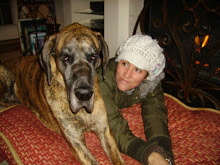

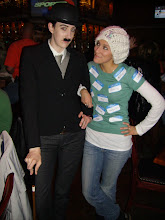
.jpg)
